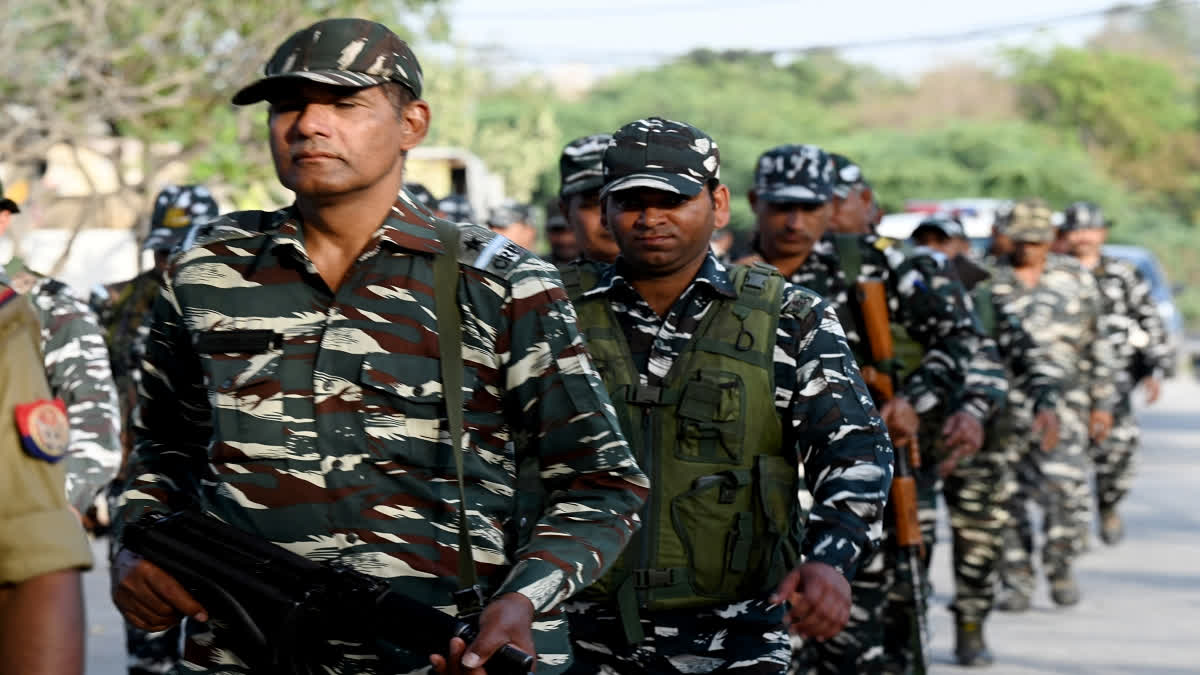New Delhi:As India observes the 'Valour Day' of the Central Reserve Police Force (CRPF) on April 9, a former Director General of the country's largest paramilitary force suggested more relaxation in transfer and posting for its personnel to further utilise the potential of the force.
What is Valour Day
Valour Day is observed on April 9 every year in remembrance of extraordinary bravery, unparalleled courage, exemplary fortitude and steadfast devotion to duty even at the cost of life displayed by merely two companies of CRPF on April 9, 1965, at Sardar Post on Rann of Kuchh, Gujarat, against a full-fledged brigade attack deceptively orchestrated by the Pakistan Army.
In this fierce battle, 34 Pakistani soldiers were neutralised while four were apprehended alive. Six bravehearts of CRPF attained martyrdom on this fateful day.
The CRPF organises blood donation camps besides several other activities to mark the Valour Day. It also organises the Investiture Ceremony to hand over the gallantry awards to the brave hearts.
CRPF is one of the oldest Central Paramilitary Forces
The Central Reserve Police Force dates back to 1939, established as the Crown Representative’s Police on July 27. Later, with the enactment of the CRPF Act on December 28, 1949, it transformed into CRPF.
With a glorious history of more than eight decades, the force at present consists of 246 battalions, including 203 Executive Battalions, five VIP Security Battalions, six Mahila Battalions, 15 RAF Battalions, 10 CoBRA Battalions, five Signal Battalions and one Parliament Duty Group. In addition, there are 43 Group Centres, 22 training institutions, three Central Weapon Stores (CWS), seven ammunition workshops (AWS), three mobile workshops, four composite hospitals with 100-bed facilities, 18 composite hospitals with 50-bed capacities, and six field hospitals in its infrastructure.
Role of CRPF
With a nationwide presence, its remarkable ability to swiftly adjust to diverse situational demands, while collaborating with the state police has earned the CRPF the reputation of being one of the most widely embraced forces.
In addition to its responsibility of maintaining law and order and counter-insurgency operations, the CRPF plays a crucial role in the conduct of Lok Sabha and Assembly elections. The significance of the force is particularly pronounced in the strife-ridden regions of Jammu & Kashmir, Maoist-affected states and the Northeast.
The CRPF thwarted an attack on the Indian Parliament on December 13, 2001, and another on Ayodhya on July 27, 2005.
The CRPF has also demonstrated its capabilities in various overseas UN deployments, including missions in Sri Lanka (1987), Haiti (1995), Kosovo (2000) and Liberia (women contingent) in 2007.
The bravery of the CRPF personnel
Till date, 2255 CRPF soldiers have made the supreme sacrifice of their lives. In recognition of their operational valour, the force has been honoured with one George Cross, three King’s Police medals for gallantry, one Asok Chakra, 10 Kirti Chakra, one Vir Chakra, 39 Shaurya Chakras, one Padma Shree, 49 Police Medals for Gallantry, 202 Police Medals for Meritorious services, 2027 Police Medals for Gallantry, five Indian Police Medals for Gallantry, four Vishisht Seva Medals, one Yush Seva Medal, five Sena Medals, 114 Prime Minister’s Police Medals for Life Saving and two Jeevan Raksha Padaks.
Dilip Trivedi, former CRPF Director General
The CRPF, which has a sanctioned strength of 324,093 personnel, as per data, has the maximum number of vacancies with over 29,283 posts among all Central Armed Police Force (CAPF).
The former director general of CRPF told ETV Bharat that the CRPF is rendering service across the country from J&K to Chhattisgarh and other places, including the Northeast. The CRPF is the nodal agency during elections. One of the many things that can help the CRPF in a long way is that the government should provide satisfaction to the soldiers starting from constable to non-gazetted level officials in postings and transfers.
“When I was the CRPF DG, I tried to sort out the issue by dividing CRPF into four zones North, West, East and South so that personnel can be deputed as per their zones. I was actually about to do it, but I was prevented from doing it because of a lot of vested interests. And this has not yet been implemented,” said Trivedi.
According to Trivedi, posting a native surrounding to their region could strengthen the communication as well as intelligence skills of the force.
“The jawans should be located if not at their home state, but somewhere close by so that they can have some level of comfort. That would be a good moral booster for the force. It’s going to help the force also because if you see a man, who is from the Northeast and is posted in any area of the northeastern states he can communicate fluently being a local. He will be able to provide you with intelligence inputs, too,” he said.
A person from Madras sent to J&K and a person from J&K sent to Madras, it’s a major hurdle, said Trivedi.
It was during Trivedi’s tenure that the VIP security training centre of CRPF was established in 2013 at Surajpur in Greater Noida.
“We can change the normal battalion into RAF battalion. Like CoBRA, we can have specialised battalions to depute in J&K and in Northeast rather than have general duty battalions,” Trivedi suggested.
Highlighting the importance of the specialised forces of CRPF, Trivedi said that the specialised forces should move towards specialisation wherever they are posted.
“CoBRA was established to fight against the threat of Maoism. For rioting and law and order-like situations, the RAF was formed. "I had requested the then Home Minister Rajnath Singh to increase the number of RAF battalions to 20. However, five more were added taking the total number of battalions up to 15. In fact, every State government thinks of having RAF battalions in their state,” said Trivedi.
